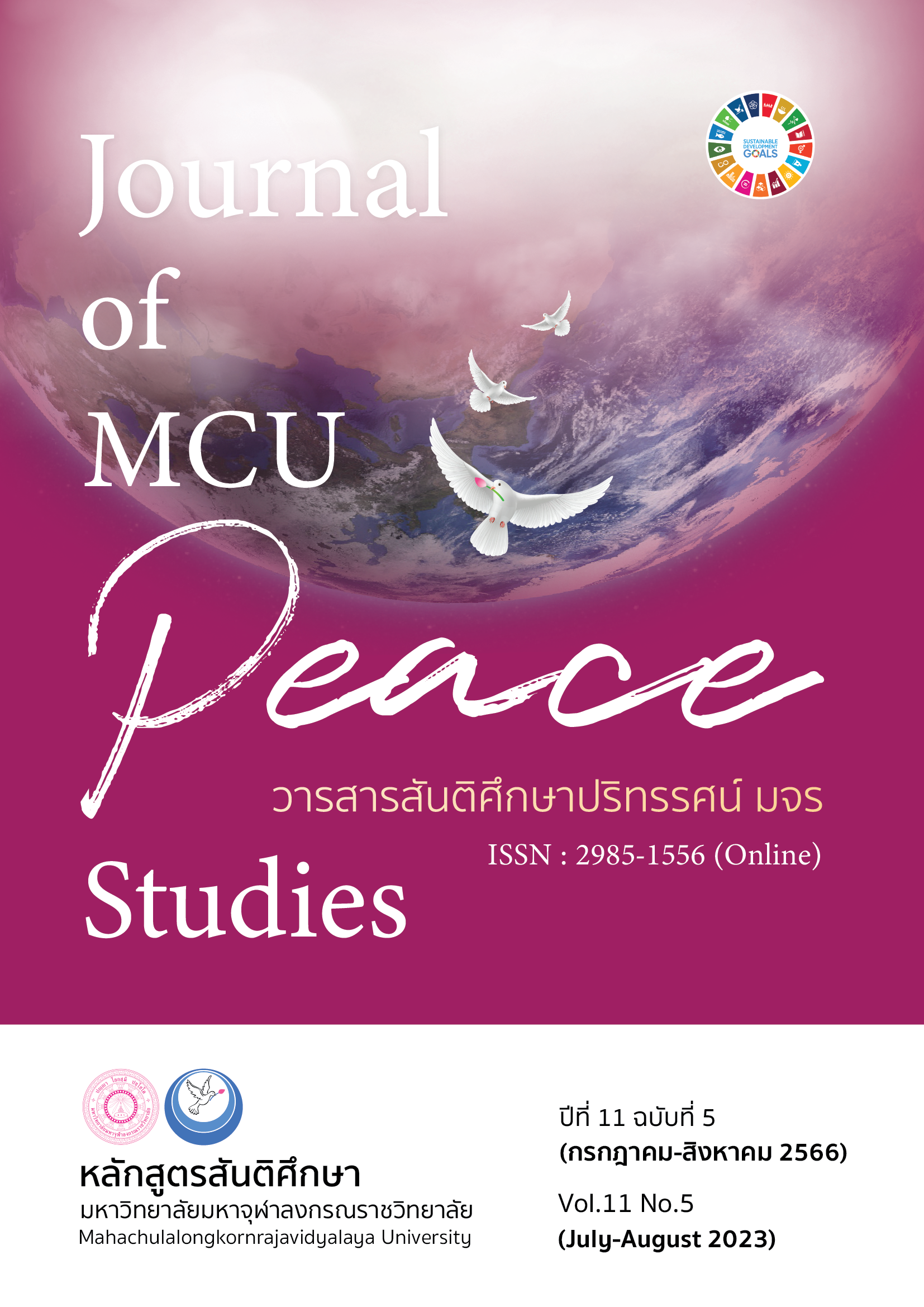การพัฒนากุลยุทธ์การบริหารนวัตกรรมทางการศึกษาในยุคการศึกษา 5.0
Main Article Content
บทคัดย่อ
บทความวิจัยนี้มีวัตถุประสงค์เพื่อ 1) ศึกษาสภาพที่พึงประสงค์และสภาพปัจจุบันของการบริหารนวัตกรรมทางการศึกษาในยุคการศึกษา 5.0 2) พัฒนากลยุทธ์การบริหารนวัตกรรมทางการศึกษาในยุคการศึกษา 5.0 และ 3) ทดลองใช้กลยุทธ์การบริหารนวัตกรรมทางการศึกษาในยุคการศึกษา 5.0 การวิจัยเชิงคุณภาพ ประกอบด้วย 1) การสัมภาษณ์เชิงลึกจากผู้เชี่ยวชาญด้านการบริหารสถานศึกษาและนวัตกรรม จำนวน 5 คน โดยการเลือกแบบเจาะจงตามเกณฑ์ที่กำหนด เก็บข้อมูลด้วยแบบสัมภาษณ์กึ่งโครงสร้าง วิเคราะห์ข้อมูลด้วยการวิเคราะห์เนื้อหา 2) การวิเคราะห์สภาพแวดล้อมและพัฒนากลยุทธ์ เก็บข้อมูลจากผู้เชี่ยวชาญด้านการบริหารสถานศึกษาและนวัตกรรม จำนวน 12 คน ด้วยการจัดการสนทนากลุ่ม เครื่องมือที่ใช้ คือ ตารางวิเคราะห์ SWOT และตาราง TOWS Matrix วิเคราะห์ข้อมูลโดยการวิเคราะห์เนื้อหา 3) การทดลองใช้กลยุทธ์การบริหารนวัตกรรมทางการศึกษาในโรงเรียนเตรียมอุดมศึกษาพัฒนาการปราณบุรี เก็บข้อมูลโดยใช้แบบบันทึกผลการใช้กลยุทธ์ฯ วิเคราะห์ข้อมูลด้วยการวิเคราะห์เนื้อหา ส่วนการวิจัยเชิงปริมาณ กลุ่มตัวอย่างที่ใช้ คือ โรงเรียนในสังกัดสำนักงานเขตพื้นที่การศึกษามัธยมศึกษาในเขตภาคกลาง จำนวน 181 แห่ง เก็บข้อมูลจากผู้อำนวยการสถานศึกษาและครูผู้สอน จำนวน 362 คน กำหนดกลุ่มตัวอย่างด้วยการสุ่มแบบแบ่งชั้นตามสัดส่วนกระจายกลุ่มจังหวัด เครื่องมือที่ใช้ คือ แบบสอบถาม สถิติที่ใช้ ได้แก่ ร้อยละ ค่าเฉลี่ย ส่วนเบี่ยงเบนมาตรฐานและค่าความต้องการจำเป็น (PNImodified)
ผลการวิจัยพบว่า 1. สภาพพึงประสงค์ของการบริหารนวัตกรรมทางการศึกษาในยุคการศึกษา 5.0 โดยรวมและรายด้านอยู่ในระดับมากที่สุด ( = 4.64) และสภาพปัจจุบันของการบริหารนวัตกรรมทางการศึกษาในยุคการศึกษา 5.0 โดยรวมและรายด้านอยู่ในระดับมาก (
= 4.06) ลำดับความต้องการจำเป็นในการพัฒนา คือ นวัตกรรมด้านการบริหารจัดการ (PNImodified = 0.18) ควรได้รับการพัฒนาเป็นลำดับแรก และนวัตกรรมด้านการวัดและประเมินผล (PNImodified = 0.13) เป็นลำดับสุดท้าย 2. กลยุทธ์การบริหารนวัตกรรมทางการศึกษาในยุคการศึกษา 5.0 ประกอบด้วย 5 กลยุทธ์หลัก ได้แก่ กลยุทธ์ด้านนวัตกรรมหลักสูตร กลยุทธ์ด้านนวัตกรรมการเรียนการสอน กลยุทธ์ด้านนวัตกรรมสื่อการสอน กลยุทธ์ด้านนวัตกรรมการวัดและประเมินผล กลยุทธ์ด้านนวัตกรรมการบริหารจัดการ และมีทั้งสิ้น 15 กลยุทธ์รอง 3. ผลการทดลองใช้กลยุทธ์ฯ พบว่า มีความเป็นไปได้ เหมาะสม ถูกต้อง และเป็นประโยชน์ และมีประสิทธิภาพและสามารถนำไปปฏิบัติได้ทุกกลยุทธ์
Article Details

อนุญาตภายใต้เงื่อนไข Creative Commons Attribution-NonCommercial-NoDerivatives 4.0 International License.
ทัศนะและความคิดเห็นที่ปรากฏในบทความในวารสาร ถือเป็นความรับผิดชอบของผู้เขียนบทความนั้น และไม่ถือเป็นทัศนะและความรับผิดชอบของกองบรรณาธิการ ยินยอมว่าบทความเป็นลิขสิทธิ์ของวารสาร
เอกสารอ้างอิง
Bhakdinarinath, S., & Osatis, C. (2018). Model of Social Management Innovation and Thailand 4.0 Policy. Journal of the Association of Researchers, 23(1), 49-59.
Chamchoy, S. (2012). Concept of Innovation for School Management in the 21st Century. Journal of Education Naresuan University, 14(2), 117-128.
Chanruam, R. (2017). Dual System School Management Innovation Base on the Concept of Career-Related Programed. (Doctoral Dissertation). Chulalongkorn University. Bangkok.
Chatwattana, P. (2021). Creative Educational Innovations Based on Experiential Learning to Enhance Education of Digital Learners. Journal of Industrial Education, 20(1), C1-C9.
Edward, W. D. (2018). The New Economics for Industry, Government, Education. (3rd ed.). London: Massachusettys Institute of Technology.
Hanafee, Y. (2019). Guidelines for Promote Innovative Leadership of Teacher at Samkhok School under the Pathum Thani Provincial Administration Organization. Journal of Educational Administration and Leadership, 31(8), 332-340.
Healermans, & De Witte. (2012). The Role of Innovations in Secondary School Performance: Evidence from a Conditional Efficiency Model. European Journal of Operational Research, 223(2), 541–549.
Heemadam, F., & Buosonte, B. (2021). The Creative Designing of Learning Measurement Innovation. Rajabhat Maha Sarakham University Journal, 5(1), 16-26.
Ingard, S. (2021). Online Learning Management Affecting the Continuing Learning Intention in a New Normal of Undergraduate Students. MUT Journal of Business Administration, 18(1), 28-45.
Jonassen, D. (1999). Designing Constructivist Learning Environments. In C. Reigeluth, (Ed.), Instructional-Design Theories and Models: A New Paradigm of Instructional Theory. University Park: Pennsylvania State University.
Khamchoo, L. (2015). Strategies for the Management of Innovation and Educational Technology in 59 School Network, Bangplat, Bangkok Metropolitan Administration. (Doctoral Dissertation). Chulalongkorn University. Bangkok.
Lhaosrirattana, S. (2016). Guidelines for the Development of the Courts of Justice under the Office of the Courts of Justice, Region XII towards an Innovative Organization. SSRU Graduate Studies Journal, (12)3, 43-59.
Morakul, R. (2017). A Factor Analysis of Innovative Organization of School in the Basic Education. (Doctoral Dissertation). Nakhon Pathom Rajabhat University. Nakhon Pathom.
Namburi, S. (2019). Innovation and Administration. The Journal of Research and Academics, 2(2), 121-134.
Office of the National Economic and Social Development Council. (2018). National Strategy 2018-2037. Bangkok: Office of the National Economic and Social Development Council.
Patpol, M. (2018). Curriculum Assessment for Learning and Development. Bangkok: Fastbooks.
Phramaha Yothin Mahaviro (Massuk). (2021). Teaching Strategies for Social Studies in the Context of the Digital Economy. Journal of Buddhistic Sociology, (6)3, 89-104.
Silarat, P. (2016). Education 4.0 Is More than Education. Bangkok: Chulalongkorn University Press.
Siririn, J. (2019). Innovation Management Take the School to Education 5.0. Retrieved September 5, 2019, from https://www.salika.co/2019/09/05/innovation-management-educational-5-0era/
Sirisereewan, A., & Chaemchoy, S. (2021). Current and Desirable Conditions and Needs of Academic Management Development for Private Primary Schools in Bangkok Based on the Concept of People Skills in Society 5.0. Rajabhat Maha Sarakham University Journal, 15(2), 171 – 182.
Tonghom, J. (2017). Develop of Online Curriculum to Enhance Creative Innovation Skills. (Doctoral Dissertation). Srinakharinwirot University. Bangkok.
Watthanmongkol, W. (2018). The Crisis of Education in the Thailand 4.0 Era. MBU Education Journal, (6)1, 427-444.


